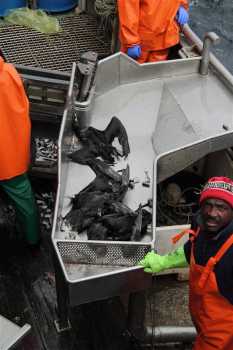John Paterson (BirdLife Albatross Task Force Member) has reported on the large numbers of ACAP-listed and Vulnerable White-chinned Petrels Procellaria aequinoctialis being killed on longlines set in the waters of Namibia. He recently observed over two trips a total of 228 000 hooks set which resulted in 92 birds being hooked and drowned.
John reports "[i]t is now mid-winter in Namibia which means that the birds are congregating in the over-wintering feeding grounds looking for any food they can find. Of course a fishing vessel provides easy pickings for hungry birds. We were at-sea over the full moon period which improves night visibility making it easier for the night foraging White-chinned petrels to see the baits as they are set behind the longliner. This is the most dangerous period in terms of seabird bycatch." (click here for the full account).

Drowned White-chinned Petrels in the hauling bay of a Namibian longliner. These birds were caught when concrete and not steel weights were in use
Photograph by John Paterson
More positively an experiment using steel instead of concrete weights to sink the lines out of the reach of birds quickly being conducted by John Paterson (click here) has shown that bycatch can be "greatly reduced". John goes on to say "[b]y the time I finish another two or three trips we will have a really strong case for implementing bird-scaring lines and improved line weighting in combination with night setting as the best practice suite of mitigation measures for this fishery. We are confident that this combination will dramatically reduce seabird bycatch."
Let us hope so!
With thanks to Oli Yates for information.
John Cooper, ACAP Information Officer, 17 July 2012

 English
English  Français
Français  Español
Español